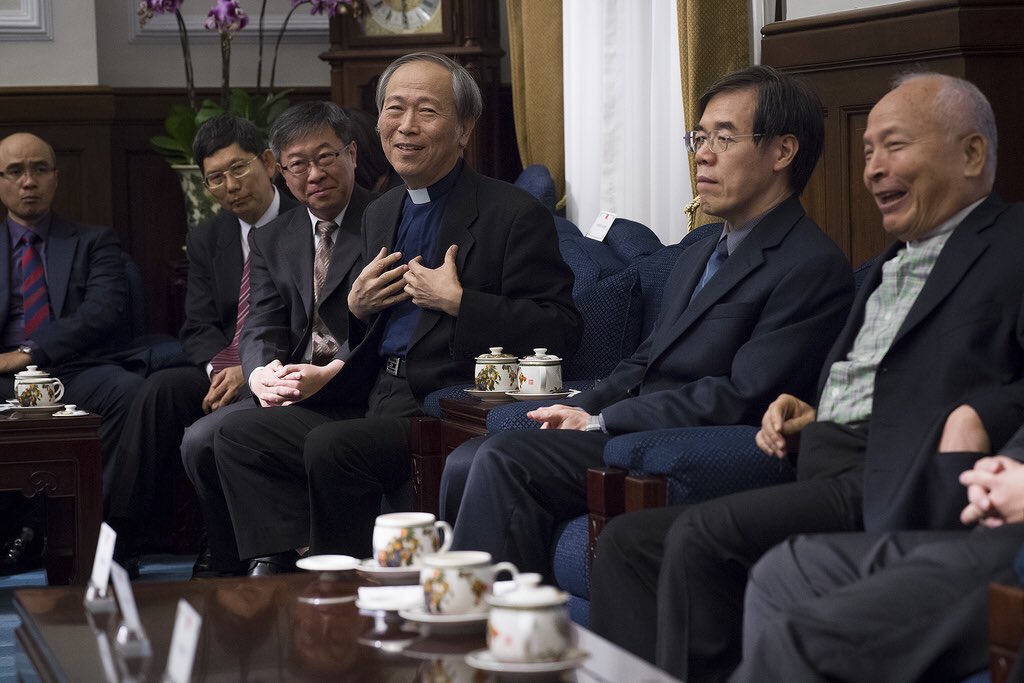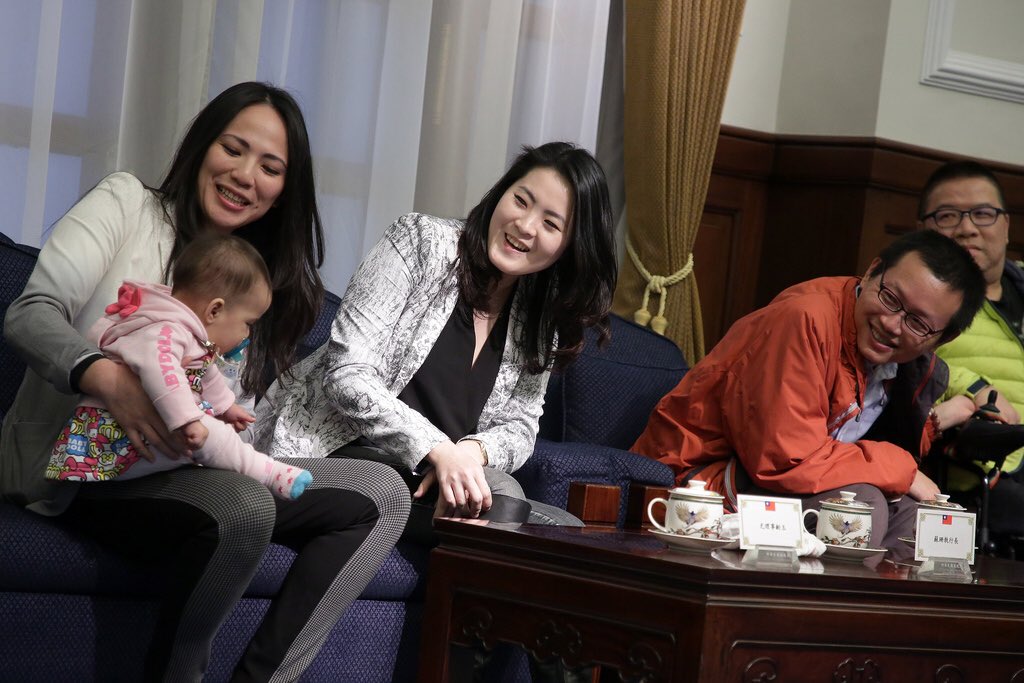by Brian Hioe
語言:
English
Photo Credit: Presidential Office
WHATEVER THE CLAIMS of the Tsai administration that it continues to concern itself with the issue of gay marriage, the Tsai administration has evidently changed tack, now attempting to play the role of “peacemaker” between pro-marriage equality and anti-marriage equality groups in Taiwan. This is a notable shift from the Tsai administration’s election promises that it would legalize marriage equality in Taiwan, as part of its attempts to construct a progressive image for itself to win over young Taiwanese voters and to project a politically progressive image for Taiwan in the international sphere as a way for Taiwan to distinguish itself from China.
However, while the Tsai administration was once happy to use the issue of marriage equality as a centerpiece of its campaign platform, the Tsai administration sharply backed away from the issue after unexpected resistance from anti-marriage equality activists, with rallies in past months organized by the “Protect the Family Alliance” (護家盟) numbering in the tens of thousands. The Protect the Family Alliance was a group previously focused on opposing sexual education in schools which it saw as too gay-friendly, but the possibility of marriage equality being legalized in Taiwan led the group to switch focus to opposing marriage equality. The large demonstrations organized by the group indicated stronger social opposition to gay marriage than many had previously counted on, with LGBTQ organizations in many cases assuming that marriage equality was all but a fait accompli in Taiwan. The Protect the Family Alliance largely consists of members of fundamentalist Christian groups, and is far from representative of mainstream opinion, but through its mobilizations, it has succeeded in constructing the appearance of larger opposition to gay marriage than actually exists in Taiwanese society.
 Representatives of anti-marriage equality groups at the recent meeting between representatives of pro-marriage equality and anti-marriage equality groups organized by Tsai on February 18th. Photo credit: Presidential Office
Representatives of anti-marriage equality groups at the recent meeting between representatives of pro-marriage equality and anti-marriage equality groups organized by Tsai on February 18th. Photo credit: Presidential Office
Following the Protect the Family Alliance’s protests, fractures began to appear in the DPP regarding the issue of marriage equality, with elements of the DPP not appearing to be as in favor of legalizing marriage equality as Tsai was. Ker Chien-Ming, the DPP majority speaker, is seen by many as fronting opposition within DPP legislators to legalizing marriage equality, although it is possible that Ker is covering for junior DPP legislators in his actions. Challenges to the legalization of marriage equality are also forthcoming from the DPP-controlled Ministry of Justice. Very probably elements of the DPP were never in favor of gay marriage to begin with, and the Protect the Family Alliance’s protests provided leverage for DPP legislators to backslide on the issue of marriage equality.
And so part of the Tsai administration’s failures on the issue of marriage equality ultimately return to Tsai’s inability to hold her party in check. The DPP should have no issue pushing marriage equality into law, seeing as it controls the Judicial Yuan, Executive Yuan, Ministry of Justice, and holds the presidency. But it seems that Tsai is unable to control some factions of the party on the issue of marriage equality.
To begin with, we do well to remember that the Tsai administration’s advocacy of marriage equality was always a calculated move, as an easy issue with which to drum up public support. That Tsai Ing-Wen embraced the issue of marriage equality represented that it was a safe political move for Tsai to come into the open with such a stance, having not emphasized this stance very strongly in her political career before that.
Yet now, with a show of resistance by anti-marriage equality groups, the Tsai administration no longer views support for marriage equality as a safe political stance, but one which is potentially risky. Hence the withdrawal of overt support for marriage equality by the Tsai administration, with the Tsai administration emphasizing that it will instead seek to create a space for dialogue between opposing political camps. Indeed, the Tsai administration broadly aims to avoid the appearance of accentuating social divisions in recent months, with some in society perceiving the Tsai administration as accentuating social divisions between the pan-Blue and pan-Green camps through transitional justice legislation or its current investigation targeting the KMT’s illegal party assets.
 Representatives of pro-marriage equality groups at the same meeting. Photo credit: Presidential Office
Representatives of pro-marriage equality groups at the same meeting. Photo credit: Presidential Office
It seems, then, that marriage equality is the issue that the Tsai administration has decided to avoid pushing on in efforts to maintain a bipartisan image, as observed in attempts of the Tsai administration to act as if bipartisan, rational dialogue can be conducted between pro-marriage equality groups and the religious fundamentalist groups which are opposed to them. It may be that the Tsai administration is planning to shelve the issue of marriage equality until its second term, possibly hoping to attract LGBTQ voters and their allies once again through promises of legalizing marriage equality while campaigning, or simply because it views marriage equality as an issue which could threaten its chances of reelection.
Of course, for obvious reasons, one can therefore accuse the Tsai administration of hypocrisy on the matter. But at this point, political retrenchment from the Tsai administration should not be surprising. It seems probable that the DPP wishes to attain the much-vaunted goal of making Taiwan the first country in Asia to legalize gay marriage, again, as a way to garner international attention for Taiwan and to further distinguish Taiwan from China. However, if the DPP likely wishes to pass civil partnership legislation off as marriage equality as a compromise to opponents of marriage equality who claim legalizing same-sex marriage will be disruptive to the family as the basic unit of society, it is also remains wholly possible that with such retrenchment to date, the DPP may also decide the issue is too dangerous and back away from it altogether. Much will depend on the coming months, once the current legislative recess ends, and the issue will be discussed in legislature once again.

